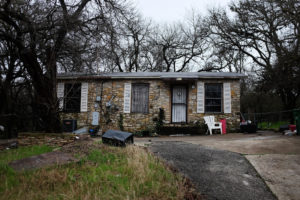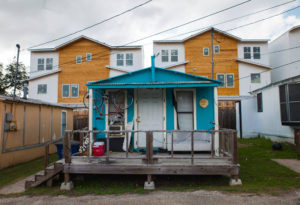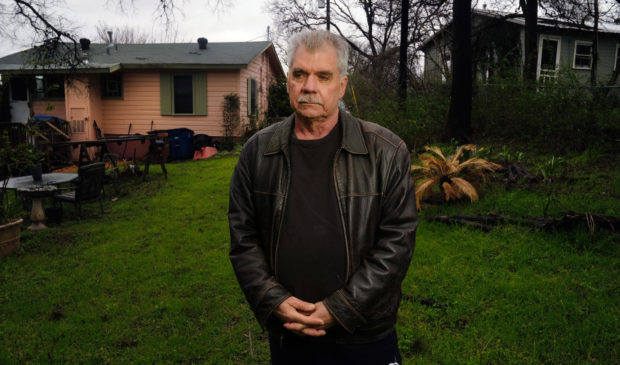Two adjacent East Austin streets, two tales of development
Friday, February 17, 2017 by
Audrey McGlinchy, KUT Danny Fowler stands in the middle of his driveway holding a vase full of red flowers.
He is taking them to his neighbor, who lives just across the street, over the crest of the steep hill that cuts this East Austin cul-de-sac in two. The street, which begins as E.M. Franklin Avenue before morphing into Grant Street, makes up Ebony Acres, a historically black neighborhood.

Jorge Sanhueza-Lyon/KUT News
“It’s become apparent to us that this is a really unique part of the Austin social fabric,” said Fowler, who moved into the neighborhood roughly 15 years ago. “(When) Ebony Acres was originally formed, it was outside the city limits of Austin, and it was established as an enclave where African-Americans were welcome to come and buy and build their homes and raise their families.”
It’s this history that Fowler has been recording as part of an application to get the area listed as a historic district. The designation allows a neighborhood to set regulations for demolition and changes made to homes in the area. Three of the 12 homes in Ebony Acres are slated to be torn down, and the news has started a conversation about preservation.
“We realize that development and redevelopment is inevitable,” Fowler said. “We do feel it is possible that the two can go hand in hand, that these houses could be preserved and there could be newer housing built at the same time.”
Just one street away, the potential future of Ebony Acres is playing out in full force. On Pennsylvania Avenue, roughly half of the homes – seven – are set to be demolished. All the homes, plus those three in Ebony Acres, are owned by attorney Scott Way.
“The land in that area has been long underutilized,” Way said. He bought most of the homes more than a decade ago and said he had always planned to redevelop the area. While he still owns the homes, he said he is talking with builders MX3 Homes or an associate about selling. The company represented him at the city’s Historic Landmark Commission when these demolition permits came before it.
Way said the homes sit on 8 acres of land, and a developer could build up to 60 homes.
“We all talk about wanting a more dense city,” he said. “This is a way to do that.”
According to two renters who lived in Way’s properties, the homes were in disrepair and had problems with a leaking ceiling and rodents.
“It was certainly old and needed a lot of work and had not really been kept up with over the years,” said Errin Delperdang, who lived in one of the homes on Pennsylvania Avenue for more than three years. But, she said, it was affordable. She paid $900 a month for a two-bedroom home. The average rent for a two-bedroom apartment is currently $1,333 a month, according to Austin Investor Interests LLC.

Pavel Mezihorak for KUT News
Way said he kept up the properties but that they were in substandard condition when he bought them.
To people like Fowler, the condition is beside the point. It’s the memory of the people who lived in them. According to his research, one of the homes in Ebony Acres belonged to L.D. Davis, the owner of the White Swan bar on East 12th Street. According to county documents, Way bought the home from Davis’ wife, Pearlie, in 2006.
And while Fowler remembers the Davises, so does neighbor Annie Hancock. Hancock, 86, is often the recipient of Fowler’s flowers, which he grows in his backyard. She estimates that she moved into her home in 1959. She is the last black resident in the neighborhood.
“When I came in here, the street wasn’t paved,” Hancock said. “It was dirt.” The family also had to dig their own sewage lines – something Hancock realized when she fell into a puddle of sewage in her neighbor’s backyard.
While Fowler, who is white, has compiled a history of a neighborhood that was not his at the time, Hancock’s daughter, Beverly Polk, said she does not feel that he and the other non-black neighbors are misusing black history to stop development.
“I don’t see it that way, and my mother doesn’t see it that way,” said Polk, 51, who lives in Temple but grew up in her mother’s home in Ebony Acres. “We just see someone trying to support. Because (Fowler) saw it before the change happened. He was here.”
Polk said while it’s the history of the people that is considered in preservation, it’s also the look of the neighborhood.
“This street is quiet and it’s peaceful,” she said. “Now you’re talking about tearing down two houses, which is part of our history. And then you’re going to bring all the traffic, oncoming traffic, through here, which is another reason to be concerned. It wasn’t like that. We’re not used to that.”
According to Way and the neighbors, the plan is to build a city road connecting Pennsylvania Avenue to Ebony Acres through the spot where two homes are set to be demolished on Grant Street.
Fowler said when he moved to the area more than a decade ago, he felt the tides were changing – as they are once again.
“I realized that when I first moved in here that I was kind of standing at the edge,” he said. “That there was one world, one culture, that was slowly passing away, and it was a transition and there was something else new coming in.”
Photo of Danny Fowler by Jorge Sanhueza-Lyon/KUT News. This story was produced as part of the Austin Monitor’s reporting partnership with KUT.
The Austin Monitor’s work is made possible by donations from the community. Though our reporting covers donors from time to time, we are careful to keep business and editorial efforts separate while maintaining transparency. A complete list of donors is available here, and our code of ethics is explained here.
You're a community leader
And we’re honored you look to us for serious, in-depth news. You know a strong community needs local and dedicated watchdog reporting. We’re here for you and that won’t change. Now will you take the powerful next step and support our nonprofit news organization?











